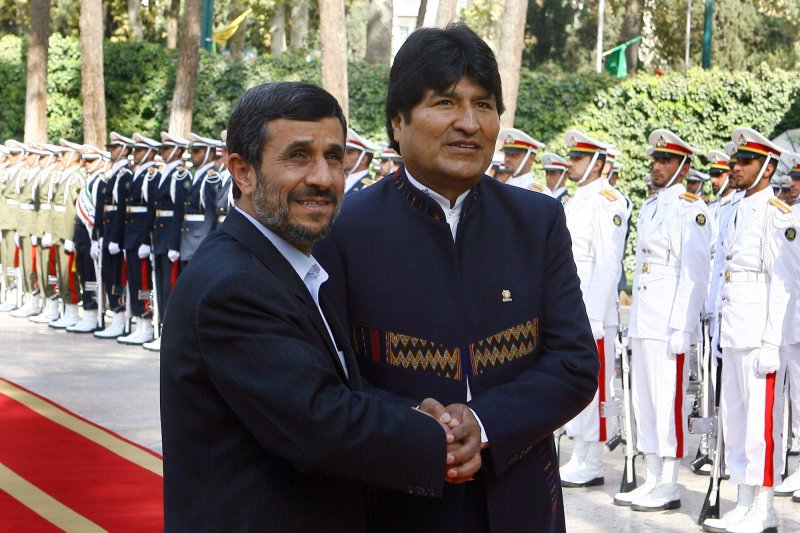Bolivian President Juan Evo Morales is greeted by Iranian President Mahmoud Ahmadinejad (L) during official welcome ceremony at the Presidential Palace in Tehran, Iran on October 26, 2010. UPI/Maryam Rahmanian |
License Photo
WASHINGTON, May 10 (UPI) -- Recently, the United States and Colombia signed a long-awaited free trade agreement that is expected to boost job growth in both countries. Yet another recent trade deal that received scant attention is perhaps far more important to American interests.
Last November, Bolivian President Evo Morales announced he would partner with Iran to develop the country's vast lithium reserves. Lithium is an important mineral with a variety of uses from producing rechargeable batteries to creating various medicines.
And yet a byproduct of lithium also has a little known and insidious application: It can be used as an alternative or as an enhancer to uranium, a key component needed to develop nuclear weapons. In particular, lithium-6 is an internationally controlled substance because of its "booster" role in smaller, highly efficient thermonuclear devices.
In other words, it makes bad bombs smaller, worse and also more portable. And thus policymakers should be concerned that the deal with Bolivia could bring the Islamic Republic one step closer to nuclear capability.
For several years now, the two countries have had a close relationship and Morales and has met with Iranian President Mahmoud Ahmadinejad on numerous occasions to bolster their economic, diplomatic and military cooperation.
In 2007, they signed their first trade and energy agreement, which has since been renewed indefinitely. Iran provides technical and financial support to Bolivian projects, including agriculture and mining. Tehran has also pledged $1 billion worth of aid to La Paz, a considerable sum for a country that only does about $11 billion in trade per year.
Yet it was only in May of 2009 that there emerged concerns about possible nuclear cooperation between the two countries. That's when leaked Israeli intelligence revealed fear on the part of the Jewish state that Iran was obtaining uranium supplies from Bolivia and that the two were trading in nuclear materials.
Bolivian Mining Minister Luis Alberto Echazu initially denied the allegations, claiming his country doesn't produce or export uranium. In 2010, however, Echazu admitted that there are, in fact, uranium deposits in his country and that Bolivia had extracted small amounts in the past. This past December, the two countries agreed to start building a joint nuclear plant, though Bolivia has denied that joint uranium exploitation is part of the deal.
Iran's interest in spending an inordinate amount of resources to help Bolivia industrialize its lithium mines should alarm the world.
With lithium's ability to store large amounts of energy in lighter, smaller spaces than most alternatives, many believe it could be the main source of power for the electric or hybrid vehicles of the future. The auto industry is increasingly looking to lithium batteries as its first choice to boost the power of its new models. GM, Toyota and Mercedes are all either using or considering lithium batteries in their green cars.
And it's quite possible that the Iranian government may be investing in Bolivia in an effort to join this potentially lucrative sector.
Yet it's also possible that Tehran is looking for a steady supply of a mineral that could help it further its nuclear ambitions.
Large-scale industrialization of lithium yields tritium, which is essential to the construction of boosted-fission nuclear weapons. After all, Great Britain, Russia, France and China are all believed to be capable of making lithium in the quantities needed for manufacture of these types of nuclear weapons. And the United States has tested nuclear bombs boosted by lithium; the country presumably still has a stockpile of these weapons.
The situation is complicated by the difficult relationship that Washington has had with La Paz for many years. Each country has expelled the other's ambassador and Bolivia has taken the additional step of removing U.S. Drug Enforcement Agency representatives from the country as well. Morales has accused the United States of aiding coup attempts throughout Latin America, including in Venezuela, Ecuador, Honduras and Bolivia.
For its part, the United States suspended Bolivia's tax-exempt privileges in December 2008 and, as a result, Bolivia has pledged to turn to the Iranian and Chinese markets to sell its goods.
Washington should closely monitor this connection between Iran and Bolivia. And if it determines that Iran is engaging in illicit activity, the U.S. government should engage in a full-court diplomatic press and employ a wide array of existing financial sanctions against companies and institutions that aid in Iran's illicit efforts to obtain nuclear technology.
The U.S. Treasury Department should also determine what banking relationships exist between Iran and Bolivia and whether Iran is using the Latin American financial system to circumvent international financial sanctions. It is time to stop ignoring the man behind the curtain.
The international sanctions regime is slowly yielding its desired effect; raising the financial cost of doing business with a rogue regime. But in order to further deter Iran from pursuing nuclear weapons, continued vigilance is on the part of the international community. If Bolivia is in fact helping Iran circumvent sanctions, it is time to make clear to La Paz that doing so has international consequences.
--
(Avi Jorisch, a former U.S. Treasury official, is president of the Red Cell Intelligence Group (www.redcellig.com) and the author of "ran's Dirty Banking: How the Islamic Republic Is Skirting International Financial Sanctions.")
--
(United Press International's "Outside View" commentaries are written by outside contributors who specialize in a variety of important issues. The views expressed do not necessarily reflect those of United Press International. In the interests of creating an open forum, original submissions are invited.)















